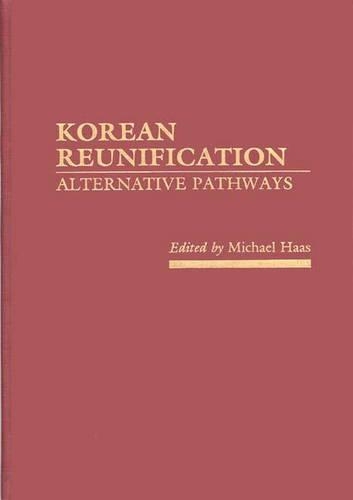
Korean Reunification: Alternative Pathways
(Hardback)
Publishing Details
Korean Reunification: Alternative Pathways
By (Author) Michael Haas
Bloomsbury Publishing PLC
Praeger Publishers Inc
16th February 1989
United States
Classifications
Tertiary Education
Non Fiction
History of ideas
320.9519
Physical Properties
Hardback
172
Width 156mm, Height 235mm
510g
Description
A collection of original papers by distinguished scholars, this volume explores a variety of strategies for the reunification of North and South Korea, based on alternative theoretical approaches. Although many policymakers and academics have been pessimistic about reunification, each of the contributors here argue that reunification could be achieved through a realistic, long-term strategy. In presenting their individual approaches to the problem, the authors first adapt a scenario for the future and then sketch a step-by-step program aimed at bringing about developments that would invariably lead to some form of reunification. Students of Asian studies, international relations, and political science will find this an illuminating treatment of the issues involved in one of the world's longest protracted conflicts. The volume begins with a history of negotiations between North and South Korea on the question of reunification and identifies the political alternatives. The contributors then evaluate various proposals for reducing tensions on the peninsula, using both academic and practical approaches. John Galtung, recent winner of the alternate Nobel Prize for Peace, argues the case for neutralization, while volume editor Michael Haas explicates a functionalist approach that stresses cooperative activities. Oran Young presents a plan for graduated, reciprocated unilateral moves for tension reduction. Subsequent papers discuss the nonviolence, mediation, and domestic political feasibility approaches in turn. The book concludes with appendixes containing the latest plans for reunification proclaimed by both governments. With world attention once again focused on Korea because of the recent Olympic Games, the issue of reunification has achieved new prominence. This volume is a timely and important contribution to the reconciliation process.
Author Bio
MICHAEL HAAS is Professor of Political Science, at the University of Hawaii at Manoa. He is the author of International Organization, Approaches to the Study of Political Science, International Conflict, International Systems, and Fundamentals of Asian Regional Cooperation.
